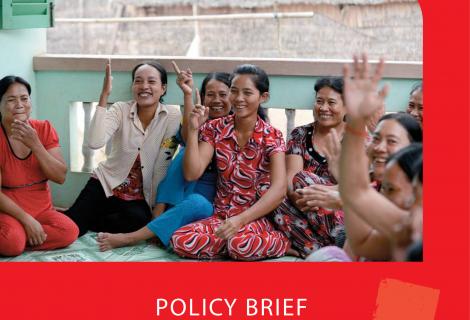
Right to Access Public Information and Invisible Barriers” is a research under the “Civil Society Empowering Rural Communities” project (Ref No: NSA 306828), funded by the European Union Delegation and implemented by ActionAid Vietnam (AAV) during 2013 ‐ 2017. This policy brief serves as a summary of the research outcomes and emphasizes the relationship between the implementation of the right to access public information (particularly by the ethnic minority community) and the accountability of Government bodies. Research on access to public information by rural communities in Ha Giang and Cao Bang provinces has demonstrated the urgent need to enact the Law on Access to public information and strengthen the implementation mechanism to ensure adequate access to public information at all levels.
Access to public information is a fundamental human right and one that is pivotal to the development of Vietnam. The 1992 Vietnam Constitution emphasized the obligation of the Government to promote and protect the rights of citizens. This right of access to information is further enshrined and expanded upon in the Universal Declaration on Human Rights (UDHR) and the International Covenants of Civil and Political Rights (ICCPR), whose article 19 assures the right of every citizen to seek, receive, and impart information and ideas through any media. Until the adoption of the 2013 Vietnam constitution, the right to access public information has been of concern to the Government though yet to be realized. With increasing penetration of the internet and other media, information and opinions are more widely available than ever before. However, it is still difficult for Vietnamese citizens, particularly the ethnic minorities to access public information. This in turn has constrained public oversight of government‐ provided services and functions.
By the time this research was completed, there was still absence of enabling laws and mechanisms to guarantee access to public information. Though the right to access public information is mentioned in a number of related laws, it was only legalized in the 2013 Vietnam Constitution. Article 25 of the 2013 Vietnam Constitution states that “The citizen shall enjoy the right to freedom of opinion and speech, freedom of the press, to access to information, to assemble, form associations, and hold demonstrations. The practice of these rights shall be provided by the law.”1 However, given the absence of the Access to public Information Law2, the implementation and oversight of the right to access public information by Vietnamese citizens is not feasible. The research has suggested albeit the right to access public information has been legalized, there are both visible and invisible barriers that hinder and discourage citizens who desire to enjoy such right.
The Access to public Information law allows citizens to understand the policies that guide government to make decisions relating to public services including health, education, housing and infrastructure projects and the factual basis for such decisions at a certain period of time. Armed with such knowledge, citizens around the world are effectuating change that allows them to create positive changes to improve their living standards and better their lives. This policy brief highlights the imperative need for government to improve public access to information for all citizens, regardless of their group or race in the society. Key highlights in the brief are gleaned from a research study entitled AAV report on Access to Public Information in Rural Communities ‐ 2014.